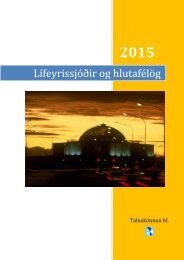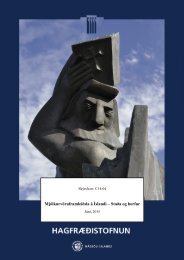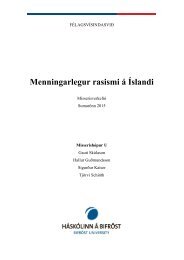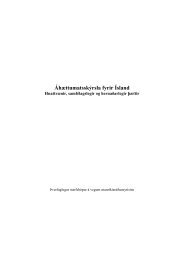Create successful ePaper yourself
Turn your PDF publications into a flip-book with our unique Google optimized e-Paper software.
WORLD REPORT 2016<br />
HUMAN RIGHTS WATCH<br />
Legislation Restricting Civil Society<br />
The new NGO law allows the authorities to arbitrarily deny NGOs registration and<br />
shut them down. The law is aimed at critical voices in civil society and could seriously<br />
undermine the ability of many domestic and international associations<br />
and NGOs, as well as community-based advocacy movements, to work effectively<br />
in Cambodia.<br />
Its restrictions on the right to freedom of association go well beyond the permissible<br />
limitations allowed by international human rights law. The law gives the interior,<br />
foreign affairs, and other ministries sweeping, arbitrary powers to shut<br />
down domestic and foreign membership groups and organizations, unchecked<br />
by judicial review, and allows them to prohibit the creation of new NGOs. It requires<br />
registered groups to operate under a vaguely defined obligation of “political<br />
neutrality,” on pain of dissolution, and criminalizes activities by unregistered<br />
groups.<br />
After passage of the law, Hun Sen and other government officials launched a<br />
campaign against human rights-oriented NGOs, including those focusing on<br />
land disputes and women’s rights. The authorities began to insist that grassroots<br />
civil society activities could no longer be carried out unless those involved<br />
had registered with the government in accordance with the new provisions, giving<br />
the government wide authority to decide what activities can and cannot take<br />
place.<br />
On August 19, the government issued a sub-decree upgrading the status of an<br />
anti-cybercrime unit and empowering it to “investigate and take measures in accordance<br />
with the law with regard to actions via the internet of instigation, insult,<br />
racial discrimination, and generation of social movements,” particularly<br />
those that might lead to a “color revolution.”<br />
On November 30, the government put a draft telecommunications law before the<br />
National Assembly, even though doing so was not inscribed in the legislature’s<br />
agenda. The draft had never been made available for discussion by concerned<br />
civil society organizations. The CPP adopted it without parliamentary debate. The<br />
law gives government authorities arbitrary powers to issue orders to telecommunications<br />
operators, to secretly monitor and record telecommunications, and to<br />
imprison people for using telecommunications in a manner deemed to endanger<br />
“national security.”<br />
Arbitrary Detention, Torture, and Other Ill-Treatment<br />
The authorities, especially in Phnom Penh, launched repeated street sweeps<br />
that detained hundreds of alleged drug users, homeless people, beggars, street<br />
children, sex workers, and people with disabilities in so-called drug treatment or<br />
social rehabilitation centers. Detainees never saw a lawyer or a court, nor had<br />
any opportunity to challenge the legality of their detention. Detained individuals<br />
received no meaningful training or health care, and faced torture, ill-treatment,<br />
and other abuses including, in some centers, forced labor. During 2015, at least<br />
three died in suspicious circumstances.<br />
Khmer Rouge Tribunal<br />
Numerous public statements by Cambodian officials and the start in June of publication<br />
of previously confidential court materials revealed numerous instances<br />
of government non-cooperation with the United Nations-assisted Extraordinary<br />
Chambers in the Courts of Cambodia (ECCC), set up to prosecute those most responsible<br />
for crimes committed by the Khmer Rouge from 1975-79.<br />
While the government allowed a trial of two former leaders of the Khmer Rouge<br />
government, Nuon Chea and Khieu Samphan, on charges of crimes against humanity,<br />
genocide, and war crimes, it refused to carry out orders by a UN secretary-general-nominated<br />
investigating judge to arrest two other former Khmer<br />
Rouge leaders, Meas Muth and Im Chem.<br />
This violated the 2003 UN-Cambodia agreement establishing the ECCC and continued<br />
a long pattern of opposition by Hun Sen to additional prosecutions. The<br />
government’s non-cooperation has seriously undermined possibilities for investigating<br />
suspects whom Hun Sen, himself a former Khmer Rouge commander,<br />
does not want brought to justice.<br />
Asylum Seekers and Refugees<br />
Since late 2014, a wave of Montagnard ethnic minority asylum seekers from Vietnam<br />
has arrived in Cambodia. Most of them practice forms of Christianity that<br />
154<br />
155










